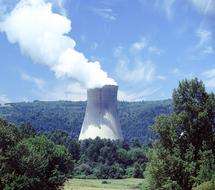Fixing carbon dioxide targets too early in the process of climate change could be dangerous, according to Oxford University researchers.
Scientists from Oxford University have suggested that climate researchers and policy makers ought to worry less about working out exactly how sensitive Earth's climate will be to a doubling of carbon dioxide in the atmosphere.
In this week's Science, Dr Myles Allen and Dr Dave Frame argue that while placing an upper limit on climate sensitivity is difficult, it may also be much less relevant to policy than is usually assumed. Dr Allen and Dr Frame’s article accompanies a paper by Gerard Roe and Marcia Baker that shows it will remain difficult to infer a robust distribution for climate sensitivity from any observations we can make of current climate.
‘No one denies that quantifying climate system feedbacks is a crucial part of our attempts to understand the climate change problem,’ said Dr Myles Allen of Oxford University's Department of Physics, ‘but putting an upper bound on climate sensitivity has become something of a Holy Grail for climate researchers. What we are suggesting is that this may not be possible or very helpful.'
Uncertainties in how climate processes feed into one another are partly to blame, as are the different statistical methods that could be used to calculate such an upper limit. If the world really does warm by 4 degrees Celsius or more the climate will be so different from what we know today that predicting when this warming will stop is all but impossible. Dr Allen and Dr Frame believe that, in trying to define an upper limit, climate modellers have to make too many assumptions about what is likely to happen – assumptions that are impossible to test.
'The only way our descendants would find out if the climate sensitivity is really as high as 5 degrees Celsius is to stubbornly hold greenhouse gas concentrations constant for centuries at a specified target level,' said Dr Frame, who is based in the Oxford University Centre for the Environment. 'In reality our descendants will continually revise their targets for atmospheric carbon dioxide concentrations in the light of the climate changes they actually observe.'
The real danger, Drs Allen and Frame suggest, comes from trying to fix a target concentration of carbon dioxide too early in the process of climate change and not adapting as new observations come along. Dr Allen comments: 'providing our descendants have the good sense to adapt their policies to the emerging climate change signal they probably won't care about how sensitive our climate is because they will have been smart enough to limit the damage.'
The development of more adaptive climate policy frameworks has support from other quarters, too. Gary Yohe, Woodhouse/Sysco Professor of Economics at Wesleyan University, said: ‘Climate policies must be predictable, but they must also adjust to new information: the challenge is to design a transparent process whereby climate policies can be adjusted in the light of genuinely new information without becoming subject to political whims.’
The perspectives article, entitled ‘Call off the quest’, by Dr Myles Allen and Dr Dave Frame is published in Science on 26 October 2007.
Source: Oxford University
























